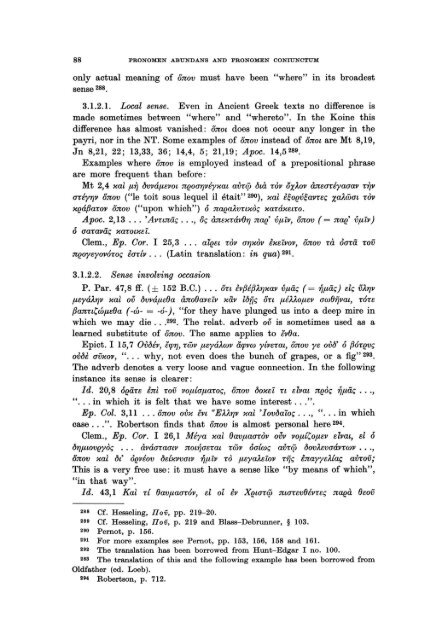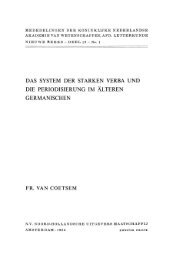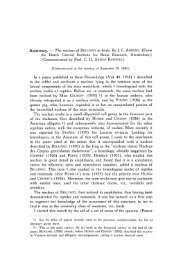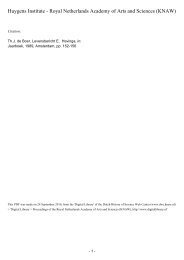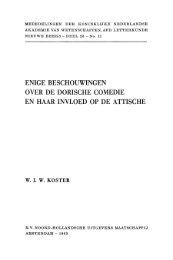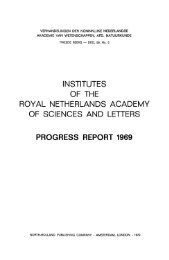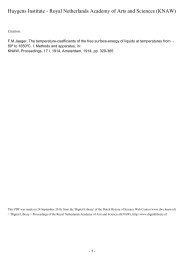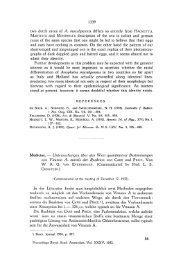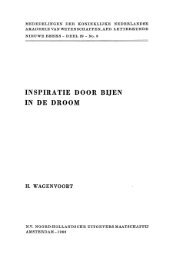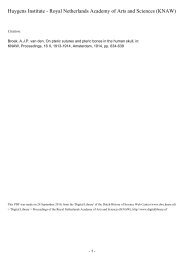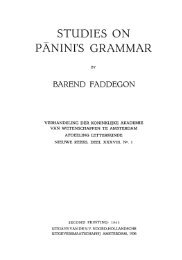Pronomen Abundans and Pronomen Coniunctum. A ... - DWC
Pronomen Abundans and Pronomen Coniunctum. A ... - DWC
Pronomen Abundans and Pronomen Coniunctum. A ... - DWC
Create successful ePaper yourself
Turn your PDF publications into a flip-book with our unique Google optimized e-Paper software.
88 PRONOMEN ABUNDANS AND PRONOMEN CONIUNCTUM<br />
only actual meaning of onov must have been "where" in its broadest<br />
sense 288.<br />
3.1.2.1. Local sense. Even in Ancient Greek texts no difference is<br />
made sometimes between "where" <strong>and</strong> "whereto". In the Koine this<br />
difference has almost vanished: onot does not occur any longer in the<br />
payri, nor in the NT. Some examples of onov instead of onot are Mt 8,19,<br />
Jn 8,21, 22; 13,33, 36; 14,4, 5; 21,19; Apoc. 14,5 289 .<br />
Examples where onov is employed instead of a prepositional phrase<br />
are more frequent than before:<br />
Mt 2,4 "at f-l~ mwáf-levot neoa'Yjvéy"at avri[> btà ràv Öx).ov ànearéyaaav r~1I<br />
aréy'Yjv önov ("Ie toit sous lequel il était" 290), "at Uoev~avreç xa).wat rà1l<br />
"eáf3aro1l onov ("upon which") ó naea).vn"àç "ará"etro.<br />
Apoc. 2,13 ... ' Avnnaç ..., öç àne"rávO'Yj nae' vf-lïv, onov (= nae' vf-lïv)<br />
ó aaravaÇ "arot"û.<br />
Clem., Ep. Gor. I 25,3 ... a'teu ràv a'Yj"à1l è"ûvov, onov rà oara rov<br />
neoyeY01l6roç èartv . .. (Latin translation : in qua) 291.<br />
3.1.2.2. Sense involving occasion<br />
P. Par. 47,8 ff. (± 152 B.C.) ... on èvf3éf3).'Yj"av Vf-laç (= ijf-laç) elç iJ).'Yj1l<br />
f-leyá)''Yjv "at 015 bvváf-leOa ànoOavûv "al' lbfiç on f-lé).).of-lev awOfjvat, r6re<br />
f3annCwf-leOa (-w- = -6-), "for they have plunged us into a deep mire in<br />
which we may die ... 292. The relat. adverb 015 is sometimes used as a<br />
learned substitute of onov. The same applies to l1l0a.<br />
Epict. I 15,7 Ovbév, lq;'Yj, rwv f-leyá)'wv aq;vw ytveTat, onov ye ovb' ó f36r(!Vç<br />
O'iJbè av"ov, " ... why, not even does the bunch of grapes, or a fig" 293.<br />
The adverb denotes a very loose <strong>and</strong> vague connection. In the following<br />
instance its sense is clearer :<br />
Id. 20,8 óeare ènt rov vOf-ltaf-laroç, 8nov bo"û nelvat neàç ijf-laç ...,<br />
"... in which it is feIt that we have some interest ...".<br />
Ep. Gol. 3,11 ... 8nov ov" lvt "E)')''Yjv "at' Iovbaioç ..., "... in which<br />
case ...". Ro bertson finds that 8nov is almost personal here 294.<br />
Clem., Ep. Gor. I 26,1 Méya "at Oavf-laaràv oVV VOf-ltCof-lev elvat, el ó<br />
b'Yjf-ltoveyàç ... àváaTaat1' not~aerat rwv óatwç avri[> bov).evaávrwv ...,<br />
önov "at bt' oevéov bet"1IVatv ijf-lïv rà f-leya).ûov rfjç ènayyeMaç avroiJ;<br />
This is a very free use: it must have a sense like "by means of which",<br />
"in that way".<br />
Id. 43,1 Kat rt Oavf-laar6v, el Ot èv Xetari[> ntarevO&reç naeà Oeov<br />
288 Cf. Hesseling, Il ov, pp. 219-20.<br />
289 Cf. Hesseling, Ilo V, p. 219 <strong>and</strong> Blass-Debrunner, § 103.<br />
290 Pernot, p. 156.<br />
291 For more examples see P ernot, pp. 153, 156, 158 <strong>and</strong> 161.<br />
292 The translation has been borrowed from Hunt-Edgar I no. 100.<br />
283 The translation of this <strong>and</strong> the following example has been borrowed from<br />
Oldfather (ed. Loeb).<br />
2t4 Robertson, p. 712.


